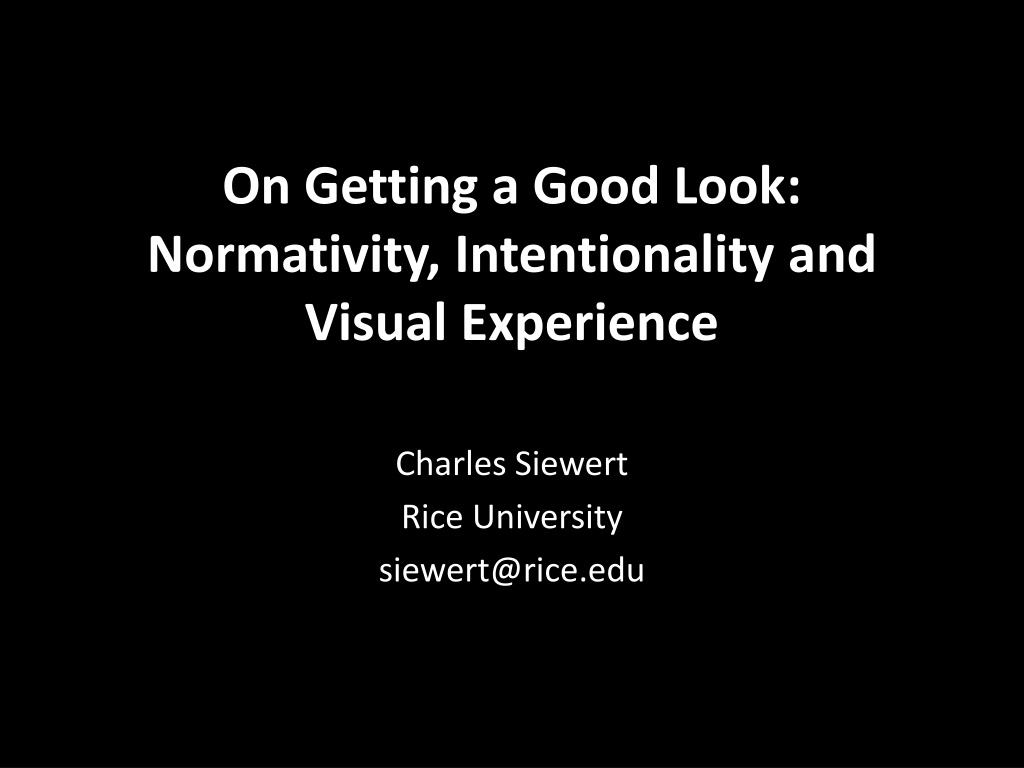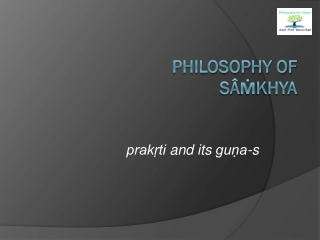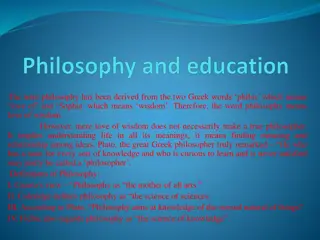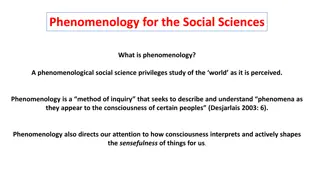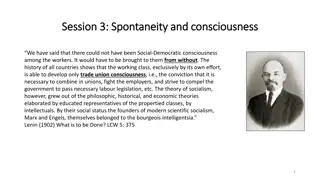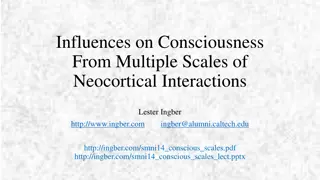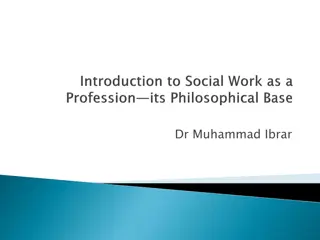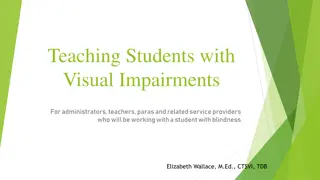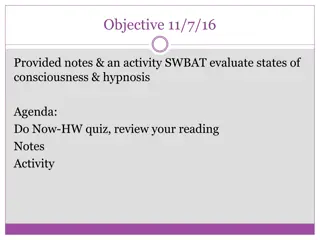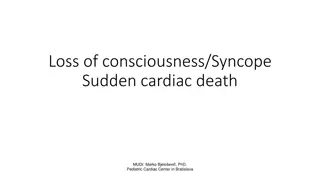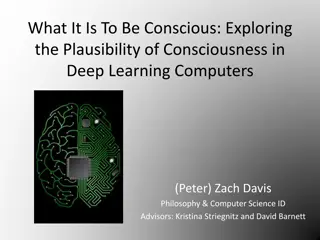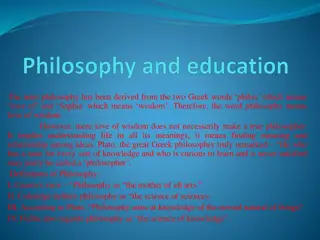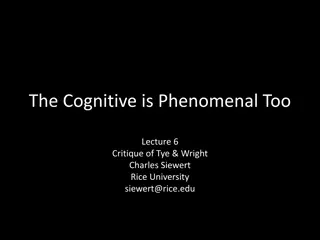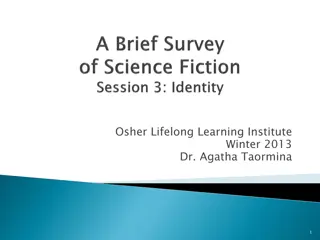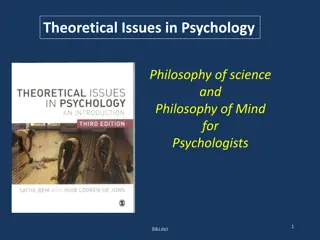Exploring Normativity and Visual Experience in Consciousness Philosophy
Charles Siewert from Rice University delves into the intersection of normativity and sensory experience within the realm of consciousness philosophy. He discusses the nonreductionist stance, a phenomenological approach, and the relationship between sensory experiences and judgments. The concept of getting a "better look" influencing warrant and justification in forming judgments is also explored.
Uploaded on Oct 02, 2024 | 0 Views
Download Presentation

Please find below an Image/Link to download the presentation.
The content on the website is provided AS IS for your information and personal use only. It may not be sold, licensed, or shared on other websites without obtaining consent from the author. Download presentation by click this link. If you encounter any issues during the download, it is possible that the publisher has removed the file from their server.
E N D
Presentation Transcript
On Getting a Good Look: Normativity, Intentionality and Visual Experience Charles Siewert Rice University siewert@rice.edu
Background: the larger project A program for a philosophy of consciousness. Nonreductionist: centered neither on defending nor on criticizing attempts to reductively explain consciousness in terms that don t presuppose it. Rather: bracketing such theories, examine the place of consciousness in our knowledge, understanding, values and agency. An aspect of this: normativity and sensory experience.
A Phenomenological Approach Phenomenological Movement. What links together the usual suspects as a matter of intellectual history: Brentano, Husserl, Stein, Scheler, Heidegger, Sartre, Gurwitsch, Merleau-Ponty, &?. My Version of Analytic Phenomenology. A practice of critical first- person reflection used to clarify distinctions and show their relevance to theoretical and philosophical issues. Influenced by (possibly continuous with) the phenomenological movement; responsive to issues and arguments in the contemporary analytic tradition. Contrasts with, e.g., heterophenomenology, and other approaches that incorporate a different conception of the use of first-person judgments when investigating experience.
sensory experiences vs. judgments When something looks somehow colored and shaped to you, or you feel its shape you have sensory experience of it. You may (or may not) go on to judge how it is from how it looks to you. Judgments can linger when sensing is gone (and arise in its absence even when visually triggered (as in blindsight)) Something s sensory appearance to you may persist even if you renounce judgment.
An issue about normativity & perception Granted, judgments have and confer normative status: They have it: They are true or false, warranted to greater or lesser degrees (or entirely unwarranted). They confer it: Some support or justify making others But does sense experience also both have and confer some sort of normative status? Not as clear. An approach to this question. First, consider the notion of getting a good (good enough, better) look at something.
The Better Look principle. If I get a better look at something than I otherwise would have had, then often, to some extent, this increases the warrant or justification I have for making certain judgments about it.
How ordinary this is Applies not only to cases of explicitly reasoned investigation in the lab Also to everyday practical affairs. There need be nothing particularly detached or theoretical about it. Consider: Glove Quest I get a good enough look at something to tell that s a glove. I have warrant for judging it to be a glove. I look for its mate, and by getting a good enough look at something else, I can tell I am warranted in thinking this is the matching glove. I want my gloves to go out into the cold. I look for them, I look at various things in the chaos of my dresser drawer There are myriad similar (unadventuresome, brief, routine) quests in ordinary life that seem to support Better Look . Looking for: sock, phone, keys, pen, exit, knife, car in next lane, etc. We warrant there it is judgments about things by getting (or having) a good (enough) look.
Getting a good enough look to judge correctly about something is not reasoning You re doing something, but what you re doing is not reasoning your way to a conclusion, justifying a claim by citing reasons to hold it. Normatively assessable activity all the same as the use of good and correct indicate. A kind of good performance that bears on arriving at truth. Why warrant or justification here in an epistemic sense seem apt.
Getting a good enough look to judge correctly is not reflective self-assessment But is at least capacity for reflective self- assessment necessary to getting a good enough look at something to judge it correctly and with warrant? Seems not. Toy Quest A young child looks for her favorite toy, has a look in the toybox, has a good enough look to tell, warrant to judge: there it is! It doesn t follow from this that she was able to critically reflect on whether conditions for looking were sufficiently favorable to warrant this judgment.
An approach to the question about experience ask: Look and Better Look Question. What is the relation between: (a) something s looking to me as it does the character of my visual experience of it and (b) my getting a better look at it? Proposal: this will help us find answers to the have status? question and confer status? questions about visual experience. For that will tell us: how does the character of visual experience contribute to the normative status of the activity of looking its being a good look, and so to its warranting a judgment?
Normativity and Visual Experience. Contrast my approach with: Davidson: Only a belief can justify a belief. States of being sensorily affected don t refer to or represent anything. Nothing in their character either qualifies them for normative status or enables them to confer it on such judgments as they may trigger. Mind and World McDowell: sense experience purports to be of something objective only because conceptual capacities are drawn into operation in it capacities that require the ability to reflectively justify one s claims.
Suspicion: dangers of under-minding, overintellectualizing Davidson under-minds the senses segregating them from understanding. Plausibility of Better Look principle gives us reason to doubt only beliefs can have and confer normative status. For it says activity of looking has/confers it. Perhaps experience also can confer normative status? And have it? Let s reconsider. Mind and World McDowell over-intellectualizes sense experience, by tying its objective purport (and hence any normative status it can a have) to capacities for reflective self-assessment. Applying Better Look (to, e.g, Toy Quest ) gives us reason to doubt such self-critical capacities are essential, for looking at something to warrant judgments about it. And so, maybe they also aren t essential to visual experience having or conferring status? Let s revisit this.
Where to look for an alternative? A popular strategy I will avoid: sense experience is representational (so it s in mind ) but its content is non-conceptual (so it s not overly intellectual). Suspicious of unrestrained and underexplained use of notions representation and content, and of idea that we can segregate conceptual and non- conceptual contents in experience.
Start instead with this further question Answer to Look and Better Look requires addressing a Perspectival Constraint Puzzle: Constrained Not Confined Question: How is it that our experience is always constrained by perspective without being confined to it? How is it possible that our visual experience, inevitably perspectivally limited, can provide us with something beyond those limits to think about and act upon? Answer will help show how the character of visual experience contributes to the normative (epistemic) role of the activity of looking.
The projected course I. (Perspectivally) Constrained, (but) Not Confined ? II. Looks/Better Look Relation? III. Have (Normative) Status ? IV. Confer (Normative) Status ? Answer in a way that neither under-minds and nor over- intellectualizes the senses And so elucidates the normativity of sense perception, And thereby prepares the way for further investigation.
Perspectival Constraint Puzzle MERLEAU-PONTY: We must attempt to understand how vision can come about from somewhere without thereby being locked into its perspective. (Phenomenology of Perception 1945 (Landes) p.69) SCHELLENBERG: How is it that a subject s perception is not limited to the ways objects are presented in her egocentric frame of reference ? How can one transcend one s egocentric frame of reference? ( Perceptual Experience and the Capacity to Act 2010, p. 152) CHURCH: How can we explain the possibility of experiencing an object s independence from our experience from within a given experience? (Possibilities of Perception, 2013,p.3) An aspect of the Problem of Transcendence. Merleau-Ponty again: We must rediscover the origin of the object at the very core of our experience, we must describe the appearance of being, and we must come to understand how, paradoxically, there is for-us an in-itself. (p. 74)
[I] The CONSTRAINED NOT CONFINED Question How is it possible that our visual experience, inevitably limited by perspective, can provide us with something to think about and act upon, beyond that perspective? Begin with some rudimentary phenomenology of visual experience.
There is phenomenal visual depth What appears to me looks, e.g., concave or convex as much as it looks circular or square. Otherwise, how do we describe illusions of depth? where something that actually is flat looks protuberant (traditional trompe l oeil) or where something that is concave looks convex (the rotating mask illusion). Without recognizing visual appearance of depth, how do we distinguish? Changing appearances of stable shape (something appears to turn) from Appearances of change in shape (it appears to morph) This also illustrates the existence of phenomenal sensory constancy
Phenomenal Sensory Constancy Something looks to you some color, shape, place or size. Perspective changes when: you shift attention (through eye, head, body movement), or when the lighting changes, or when what is apparent itself moves and then, the way its shape, location, color or size looks to you changes Still it appears the same shape, location, color, or size throughout. Look at a printed word, then just to its side, then back at it. The way its shape appears to you alters, but it does not appear to change shape, but to stay the same shape. As the rim of the cup is tilted towards you, the way the shape of its rim looks to you changes. However, it does not appear to morph, but to retain its shape throughout.
Objects of constancy? Are there, in fact, commonly entities that appear to you unchangingly located, shaped, sized, in depth while the way they look to you located, shaped, sized alters with perspective? There are, unless either: (a) Phenomenal Flatness : you experience visual appearances, but none are visual appearances of shape/size/location constancy in depth, or else (b) Phenomenal Estrangement : you experience such perspectivally shifting appearances of shape/size/location constancy in depth , but there is, in reality, nothing of which they are appearances. Hume s philosophy of perception seems to imply (a). Skeptical demon scenarios are likely construed so as to imply (b). If the previous phenomenology of visual experience is correct, (a) is false. And for present purposes, we will simply assume (b) is false, and we don t live in demon world.
So, an answer to (I): Constrained, not Confined? Question (I) how is it possible that our visual experience, inevitably limited by perspective, can provide us with something beyond those limits to think about and act upon? Answer: if the previous phenomenology of sensory constancy is correct, we experience appearances whose subjective character varies with perspective, which are appearances of something s spatial location, shape, and size such that its being as it appears: does not vary with experiential perspective, and implies it has surfaces not apparent to us. It follows that the (perspectivally limited) subjective character of visual appearance makes the (perspective-transcending) spatial character of objects apparent to us, and so makes experience- transcending objects available for us to think about and act on.
So, an answer to (I): Constrained, not Confined? In short, the subjective character of visual experience, limited by perspective, does not leave vision locked up in it, because this same character exhibits phenomenal spatial sensory constancy.
This description of being experientially constrained not confined avoids pitfalls Doesn t remain stuck in merely paradoxical formulations. Compare Alva No s descriptions (from Action in Perception): You experience as perceptually present something which is, in fact, hidden from view. Features of scenes or objects are perceived without being really perceived. one experiences the presence of that which one perceives to be out of view. Avoids problems of appealing to 2d perspectival projections (for constraint ) and principles that generate 3d information from them (for unconfined ).
Problems with 2d perspectival projections (for constraint) and extraction of 3d information (for unconfined ). That approach either: (a) (b) puts the 2d projections in experience (J. Church, A. No ) or makes them unconscious visual representations of situation- dependent properties (S. Schellenberg). Route (a) either: (i) (ii) yields a (phenomenologically wrong) flat conception of experience; or Mixes flatness with depth, in a way that gives flat imaginings of the hidden sides of apparent bulgy objects no work to do, or produces incoherent ( flat-and-bulgy ) representations that render the accuracy of spatial experience unfathomable. Route (b) loses touch with the fact that the perspectival constraint is experiential.
But how do we do it? Granted this is a coherent description of experience that entails we are constrained not confined. To that extent it answers at least part of how possible? question. But : what kind of activity enables us to make things location, shape, size more apparent to ourselves in accordance with the phenomenology of visual constancy? Without getting into genetic psychology, we might say: a capacity for sensorimotor activity involved in looking at things. Moving in such a way that our brains can generate the constancies we experience. Will you say: all that s needed for this experience happens entirely in the brain. No need for any actual movement, engagement with objects? At best a bold speculation. For current purposes it s enough to focus on how we normally actually make things visually apparent, as far as we can tell. And that is: by moving in ways that generate experiences of visual constancy.
First steps to avoid both under-minding and over-intellectualizing We are not with Davidson: sense experience is not mere sensation Rather: it constitutes appearances of objects that go beyond the experience of them, and enables us to think about and act upon things in our surroundings sense experience (not just judgment) thus has a kind of objectual reference or intentionality of its own. We are not with Mind&World McDowell: The sensorimotor activity can plausibly make spatial objects available to us without anything like critical self-reflection. Still, just how does normativity enter the picture?
Now question (II): Looks/Better Look Relation? What is the relation between: the subjective character of your visual experience of an object (how it looks), and your getting a better look at it?
Where do normative notions get a grip? Exercising the power to produce phenomenal visual object constancy making the location/shape/size of things more apparent to me. But is more always better? Is doing whatever it takes to make something more apparent, always getting a better look at it?
Is more better? Perhaps its not that simple. Perhaps: whether making something more apparent constitutes getting a better look, will depend on context in various ways: what the environment is like, what you already know, what your interests are. For the moment, we can cautiously say this: The More/Better Principle : Often, to some extent, making something more apparent gives you a better look at it.
Answering (II): The Looks/Better Look Relation? (i) The way objects look to you (the subjective character of your visual experience of them) accords with the phenomenology of spatial constancy. If (i), then (ii) there are things whose location/shape/size you make more apparent to yourself. (iii) More/Better : Often, to some extent, making something more apparent gives you a better look at it. (iv) By (ii) and (iii): there are things that (often to some extent) you get a better look at.
Nowquestion (III): Has Status? (i) By the previous argument, by making things more apparent, you get a better look at them. (ii) If by making things more apparent, you get a better look at them, then they become better apparent to you, and they appear to you accurately (in some respect, to some extent). (iii) If things become better apparent to you and appear to you accurately, then: yes, your visual experience itself has normative status
Now (IV): Confers Status? i. The More/Better Principle: Things becoming more visually apparent to you (often to some extent) constitutes your getting a better look at them. ii. The Better Look Principle: often, to some extent, getting a better look at things increases your warrant for making judgments about them iii. Therefore, visual experience on account of its phenomenal objectual character not only has, but confers normative status. So, yes, sense experience also confers normative status
This is a start. But it leaves many questions
For example A visual agnosiac could have the power of making things apparent, but be unable to categorize an object based on its appearance. How do we get what she lacks HOW DOES EXPERIENCE GIVE US WARRANTED CLASSIFICATION of apparent objects? Often to some extent making something more apparent constitutes getting a better look at it but JUST WHEN IS MORE BETTER? WHEN IS A LOOK GOOD ENOUGH to confer (more, enough) warrant? What determines how much warrant it confers? For example, when is a glance enough, and why? HOW MUCH DOES CONSCIOUSNESS BRING with it of what is needed for perceptual normativity? Is some form of NORMATIVE SELF-ASSESSMENT required, if our activity is to be truly NORM-GUIDED? What does that minimally involve?
How does experience get us warranted classification of apparent objects? Through an experience of recognition (lacking in the agnosiac): that looks recognizable to me as a glove. And if it looks recognizable to me as a glove, I have prima facie warrant for judging: that s a glove. Not to claim: the content of sense experience is conceptual (a la McDowell). Something s appearing recognizable to me as a glove may precede my being able to operate fully competently with the concept glove in inferential thought, grasp relevant analogies. Not to claim: sense experience represents objects as having high-level properties (a la Siegel): if what looks to me recognizable to me as a glove were in fact fashioned for some other purpose entirely, it wouldn t be a glove. But from that it doesn t follow that my visual experience is illusory or inaccurate.
Just when is more better? When does making more apparent where and how things are mean: getting a better look, improving your look, at them? Proposal: When it increases : the accuracy of the judgments you are concerned to make, or the success of the actions you are concerned to take, with respect to them.
When is a look good enough? Good enough, that is, to warrant judgment. Proposal. Depends on such factors as these : Are you in an environment laden with phenomenal snares (counterfeits, misleading appearances) to which an acute inquirer should be alert? How skilled a perceiver are you? Have you seen enough of such things and been right enough in the past to trust yourself with cursory first impressions? Hidden snares might diminish your warrant for judgment, but don t show you need to rule out the possibility that the world is one big snare radical skeptical (brain in a vat) scenarios or else be utterly warrantless.
How much does consciousness bring? A deflationary argument A Cartesian thought: experience of the same subjective character as mine could be radically estranged from the world in which its possessor finds himself: it could completely fail to reveal the world in he exists. A (Heideggerian?) thought: To be de-worlded is to be de- normed. Thus if consciousness is de-worlded (as it well could be), it neither has nor confers normative status. Therefore, experience has/confers normative status only through the addition of factors that are merely contingently associated with it.
Could consciousness be de-worlded and thereby de-normed? Proposed line of response: First, suggest: I cannot de-world my own experience, so it could not in that way become for me estranged from normativity. Why it seems I can t de-world my own visual experience in thought: My understanding of change in how things look to me cannot be divorced from understanding of myself as looking at them. (Also: my understanding of change in how things feel to me cannot be divorced from my understanding of myself as touching them.) My activity of looking at them (touching them) brings a kind of commitment to their reality that can t be intellectually revoked.
Could consciousness be de-worlded and thereby de-normed? Why it seems I can t in any case de-norm my own cognitive experience: I have no understanding of the character of my experience of thinking, if not in terms that imply I can engage in conceptual thought. But these imply normative notions are applicable: my understanding of how I experience my own thinking is inseparable from taking myself as open to certain kinds of assessment. (That was responsive/irrelevant, that does/doesn t follow, that was true/false.)
But maybe: a de-worlded phenomenal twin? Thus: a de-normed twin? Possible replies: a) I could conceivably have a de-worlded phenomenal twin. And since to be de- worlded is to be de-normed, HIS EXPERIENCE WOULD HAVE NO NORMATIVE STATUS. So yes, I could have a de-normed phenomenal twin. b) I could conceivably have a de-worlded phenomenal twin, but HE WOULD STILL BE A NORMATIVE BEING, because there is a possible world (my world!) in which his experience would find a home. (Consciousness could be utterly decoupled from normative status, only if it is too chaotic or unstructured for there to be a world it would reveal.) Plus: there is the argument from cognitive experience. So no, I could not have a de-normed phenomenal twin. c) I could not conceivably have a de-worlded twin, for: to be de-worlded is to be (thoroughly) de-normed. And I CAN T MAKE SENSE OF EXPERIENCE SUBJECTIVELY JUST LIKE MINE TO WHICH NORMATIVE NOTIONS ARE INAPPLICABLE. So no, I could not have a de-normed phenomenal twin. Are we on firm ground deciding for (a) as against (b) or (c)? If not, very doubtful we have reason to detach experience from normativity.
Is normative self-assessment required to be truly norm-guided ? Ask: would a being who is not critically self-reflective but who had and exercised the power to make things apparent, be unguided by norms? Remove source for thinking so, via idea that use of critical reflection is not required for experience to be normatively valenced. Think of how the experience of keeping your balance helps you not to fall. Maybe your sense of how to get a better look at things is like keeping your balance.
Maybe your sense of how to get a better look at things is like keeping your balance. Maybe that sort of guidance should also count as a kind of self- assessment ? We might either say: it s not enough for self-assessment in any sense--but self-assessment is not essential to having normed guided performance). Or yes, some kind of self-assessment is necessary if one is to be guided by norms, but having a kind of non-reflective normatively valenced experience is minimally sufficient for both. Don t slip back into intellectualist misconstruals of valence. Feels right/Feels wrong is not a matter of attributing normative properties ( representing your movement as having the property of being right or correct.) We don t have to model all intentional experience on predicative judgment.
Basic claim: there is a phenomenological conception of the power of making things apparent that answers: I. (Perspectivally) Constrained, (but) Not Confined ? II. Looks/Better Look Relation? III. Have (Normative) Status ? IV. Confer (Normative) Status ? In a way that neither under-minds and nor over- intellectualizes the senses And so elucidates the normativity of sense perception, And thereby prepares the way for further investigation along the lines suggested.
